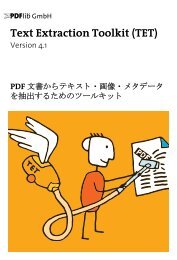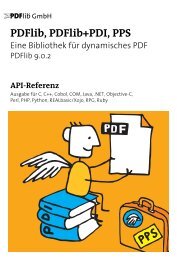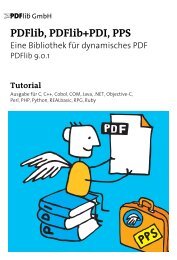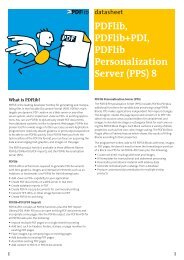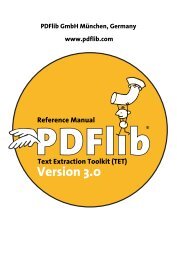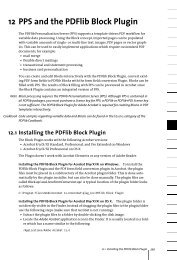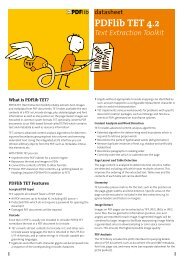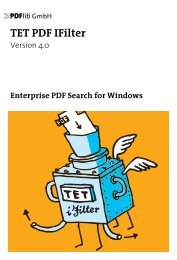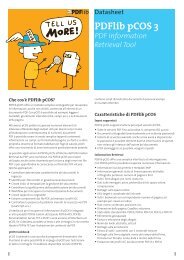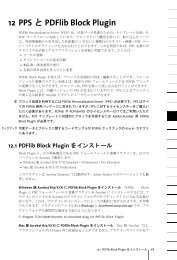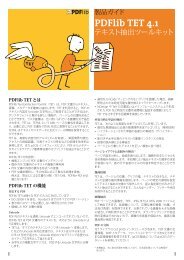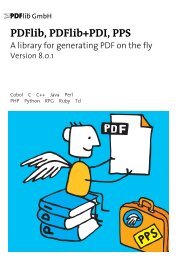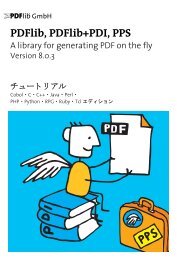PDFlib 8 Windows COM/.NET Tutorial
PDFlib 8 Windows COM/.NET Tutorial
PDFlib 8 Windows COM/.NET Tutorial
You also want an ePaper? Increase the reach of your titles
YUMPU automatically turns print PDFs into web optimized ePapers that Google loves.
You can not re-use individual elements of imported pages with other <strong>PDFlib</strong> functions.<br />
For example, re-using fonts from imported documents for some other content is<br />
not possible. Instead, all required fonts must be configured in <strong>PDFlib</strong>. If multiple imported<br />
documents contain embedded font data for the same font, PDI will not remove<br />
any duplicate font data. On the other hand, if fonts are missing from some imported<br />
PDF, they will also be missing from the generated PDF output file. As an optimization<br />
you should keep the imported document open as long as possible in order to avoid the<br />
same fonts to be embedded multiple times in the output document.<br />
<strong>PDFlib</strong>+PDI does not change the color of imported PDF documents in any way. For<br />
example, if a PDF contains ICC color profiles these will be retained in the output document.<br />
<strong>PDFlib</strong>+PDI uses the template feature (Form XObjects) for placing imported PDF pages<br />
on the output page. Documents which contain imported pages from other PDF documents<br />
can be processed with <strong>PDFlib</strong>+PDI again.<br />
Code fragments for importing PDF pages. Dealing with pages from existing PDF documents<br />
is possible with a very simple code structure. The following code snippet opens a<br />
page from an existing document, and copies the page contents to a new page in the output<br />
PDF document (which must have been opened before):<br />
int doc, page, pageno = 1;<br />
String filename = "input.pdf";<br />
if (p.begin_document(outfilename, "") == -1) {...}<br />
...<br />
doc = p.open_pdi_document(infilename, "");<br />
if (doc == -1)<br />
throw new Exception("Error: " + p.get_errmsg());<br />
page = p.open_pdi_page(doc, pageno, "");<br />
if (page == -1)<br />
throw new Exception("Error: " + p.get_errmsg());<br />
/* dummy page size, will be modified by the adjustpage option */<br />
p.begin_page_ext(20, 20, "");<br />
p.fit_pdi_page(page, 0, 0, "adjustpage");<br />
p.close_pdi_page(page);<br />
...add more content to the page using <strong>PDFlib</strong> functions...<br />
p.end_page_ext("");<br />
p.close_pdi_document(doc);<br />
The last parameter to fit_pdi_page( ) is an option list which supports a variety of options<br />
for positioning, scaling, and rotating the imported page. Details regarding these options<br />
are discussed in Section 7.3, »Placing Images and imported PDF Pages«, page 192.<br />
Dimensions of imported PDF pages. Imported PDF pages are handled similarly to imported<br />
raster images, and can be placed on the output page using fit_pdi_page( ). By default,<br />
PDI will import the page exactly as it is displayed in Acrobat, in particular:<br />
> cropping will be retained (in technical terms: if a CropBox is present, PDI favors the<br />
CropBox over the MediaBox; see Section 3.2.2, »Page Size«, page 72);<br />
> rotation which has been applied to the page will be retained.<br />
7.2 Importing PDF Pages with PDI 189



